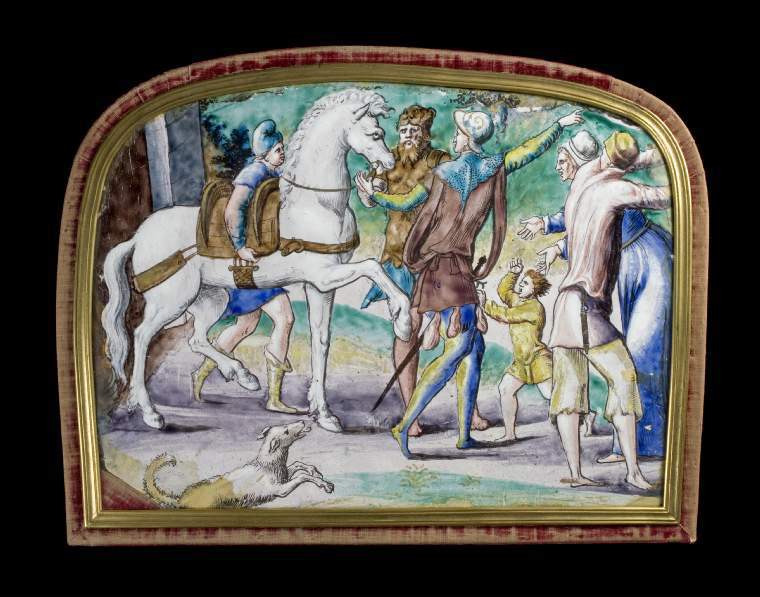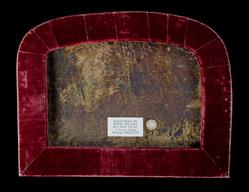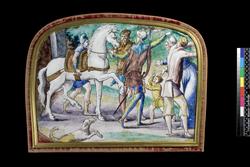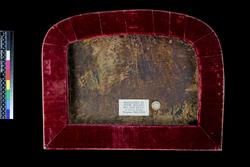Current Location: In storage
Titles
A Scene from Classical Mythology or History
Maker(s)
Maker:
Limosin, Léonard
(Probably)
Entities
Categories
Description
Copper plaque with a white ground, painted in enamels with a horse, two men, an old woman, a boy, and a dog
Slightly convex D-shaped copper plaque, painted in blue, turquoise, green, yellow, pale mulberry, pale purple, brown, black, and white enamel on a white ground. Clear counter-enamel with dark brown spots and mottled brown areas. On the left a saddled white horse stands in profile to the right. A youth wearing a turquoise phrygian cap, a blue tunic, and yellow boots stands behind the horse, and has his right arm over the saddle. Two men stand by the horse’s head holding its bridle. One, perhaps Hercules? wears a brown lion’s mask, a brown tunic, and turquoise skirt . The other who has his back to the viewer, points with his right arm towards the right. He wears a turquoise helmet al antica with feather, a brown tunic with a triangular turquoise collar over a garment with blue, green and yellow sleeves, and blue and yellow tights. He has a sword, and three brown bags are suspended from beneath his tunic. An angry small boy wearing a yellow tunic runs from the right towards the horses, shaking his fist. An old woman wearing a blue dress and white cap stands behind him gesticulating. In front of her in the foreground, another man, perhaps a peasant, has his back to the viewer, and holds out both his arms out towards the left. He wears a yellow hat, a pink tunic, and ragged calf-length breeches, and has a knife in a brown sheath suspended from his waist. In the left foreground, a white dog runs towards the figures. The ground is painted with areas of pale purple and green, and there are two yellow plants in the foreground. Gold is used sparingly on the edge of the woman’s cap, for the pattern on the sheath of the knife of the man standing in front of her, on the helmet and its feather on the other man, and on the edges of the horse’s equipment. The plaque is mounted in a D-shaped wooden frame. covered in red velvet, with a gilt-metal inner edge on the front. The frame covers the edges of the plaque at the back.
Notes
History note: Hollingworth Magniac, Colworth, Bedfordshire; his son, Charles Magniac; sold Christie’s, 2,4-8 and 11-15 July 1892, Catalogue of the renowned collection of works of art chiefly formed by the late Hollingworth Magniac Esq. (known as the Colworth Collection, 3rd Day, 5 July, lot 247; sold for £31.10.0 to Frank McClean, MA, FRS (1837-1904), Tunbridge Wells.
Legal notes
Frank McClean Bequest
Acquisition and important dates
Method of acquisition: Bequeathed
(1904)
by
McClean, Frank
Dating
16th Century, third quarter
Renaissance
Circa
1565
-
1573
Note
This plaque was attributed to Leonard Limosin and dated about 1570 by J.C. Robinson in 1862, and in the Magniac sale catalogue of 1892, where the composition was described as ‘animated even dramatic, and the execution, though verging on coarseness is bold and spiritied; it is painted in colours on a white ground, peculiar to Leonard in his later time.’ Dalton, 1912, was more cautious, remarking that it ‘appears to be by someone influenced by his style’. However, Philippe Verdier when he visited the Fitzwilliam, supported the earlier attribution to Léonard Limousin. The subject has not been identified. The lack of stirrups on the horse and the Phrygian cap worn by the man standing behind the horse, suggest that it depicts a classical rather than a contemporary subject, perhaps the departure of Hector for the Trojan War.
The thin application of translucent enamels over a white ground is a characteristic of some enamels by Limosin made in the 1560s and early 1570s The similarities between these enamels and the Fitzwilliam's plaque support its attribution to Léonard Limosin. Horses with similarly fierce eyes, and figures with elongated tapering legs appear in a plaque of 'Theseus and the Queen of the Amazons' dated 1563 in the Musée national de la Renaissance at Écouen. The dog, horse, and streaky colouring of the ground with small yellow plants are strongly reminiscent of those on an oval plaque in the Louvre representing Spring, on which a man and woman on horseback ride through a landscape accompanied by a white hound. This probably formed part of a set of Seasons, of which Winter also in the Louvre, is dated 1572. A large undated plaque in the Taft Museum, Cincinnati, titled 'The Children of Mars', depicts a contemporary scene of soldiers pillaging a village, and includes a horse with a saddle and stirrups being led away by a soldier and gesticulating figures reminiscent of those on the Fitzwilliam's plaque, particularly a man shown from the back with both arms raised to the right
School or Style
Mannerism
People, subjects and objects depicted
Components of the work
Decoration
composed of
enamels
( blue, turquoise, green, yellow, pale mulberry, pale purple, brown, black, and white)
Frame
composed of
velvet
( red)
wood
gilt-metal
Height 32.3 cm
Width 41.7 cm
Plaque
Height 27.5 cm
Width 37.5 cm
Materials used in production
slightly convex
Copper
Inscription or legends present
Inscription present: circular paper label printed in black with ‘.MAGNIAC• COLLECTION’ between concentric circles, and inscribed ‘247’ in black ink in the middle.
- Text: '.MAGNIAC• COLLECTION' printed in black, '247' hand-written in black ink
- Location: On the reverse
- Method of creation: Printed in black and hand-written in black ink
- Type: Label
Inscription present: square paper label printed in black
- Text: BEQUEATHED BY/FRANK McCLEAN/M.A. F.R.S.: F.R.A.S:/of Trinity College/November MDCCCCIV
- Location: On back
- Method of creation: Printed in black
- Type: Label
References and bibliographic entries
-
Notice of the Principal Works of Art in the Collection of Hollingworth Magniac
page(s): 50-1
-
Catalogue of the Renowned Collection of Works of Art, chiefly formed by the late Hollingworth Magniac, Esq. (Known as the Colworth Collection)
page(s): 74
-
Fitzwilliam Museum, McClean Bequest, Catalogue of the Mediaeval Ivories, Enamels, Jewellery, Gems and Miscellaneous Objects Bequeathed to the Museum by Frank McClean, M.A., F.R.S.
page(s): 113
-
Léonard Limosin au Musée du Louvre
page(s): 87
-
Les émaux peints de Limoges. Musée du Louvre, Département des objets d'art
-
Limoges Enamels
page(s): 365-6
Related exhibitions
Identification numbers
Accession number: M.44-1904
Primary reference Number: 156430
Stable URI
Audit data
Created: Saturday 6 August 2011
Updated: Monday 25 March 2024
Last processed: Wednesday 14 May 2025
Associated departments & institutions
Owner or interested party:
The Fitzwilliam Museum
Associated department:
Applied Arts

 IIIF Manifest
IIIF Manifest






